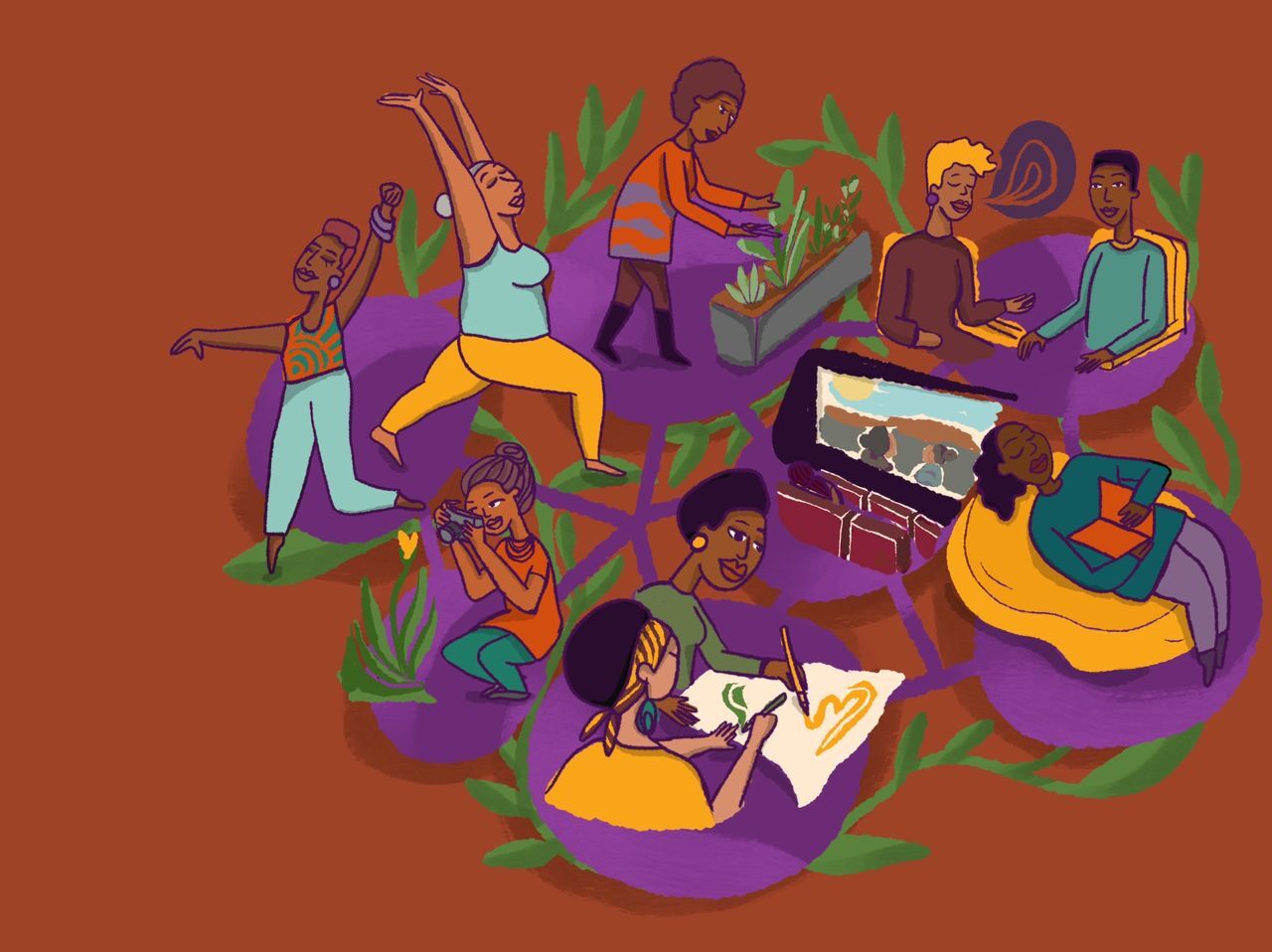Why should funders adopt decolonising frameworks and practices?

Artist credit: Nzilani Simu
Obsolete strategies to Monitoring, Evaluation & Learning (MEL) have worked to erase the voice of girls, women, Indigenous people, LGBTQI+ (and other marginalised groups) from the history of social change. Although there have been a number of alternative approaches and frameworks proposed in academic literature these remain on the periphery when it comes to their practical application in the global south. Despite resistance from social movements, mainstream funders tend to continue to impose multiple regimental reporting and data requirements on grantee partners to justify being funded. These practices still mirror implicit subordinate power relations of donor and grantee and need to change.
In this article, we take a practical transnational feminist approach to MEL. We reflect on actions that philanthropy can take and has begun to take to decolonize practices, policies and resource flows, and support transformation in relationships and power dynamics offering possibilities of creative and innovative approaches. We document our shared learning from CRIF, Fenomenal Funds, FRIDA | The Young Feminist Fund, and Purposeful organisations who are resourcing and supporting the disruption of oppressive MEL structures, tools, languages and practices as profound acts of resistance.
Rethinking Practices: who can hold and produce knowledge?
The iterative and flexible nature of learning and reflection is important for us to honour. We encourage processes of learning and knowledge production with authenticity and openness. As strategies we undertake learning calls, in-person learning visits, learning labs and draw on emergent learning frameworks to support sensemaking in their many forms; with stories, images and music as valid ways of generating and documenting.
Developing systems and frameworks for learning are an important place to start. We believe that shared governance is not just limited to grantmaking but can extend to designing learning agendas, learning frameworks, accountability and oversight. This can be done by creating brave spaces centring learning and inclusion of partners’ needs. We do this through dialogue, co-creation of a common vision and supporting dissent and the freedom to experiment. In these spaces learning happens by interacting with one another. With this approach what we want to know, and what knowledge is of value is determined by the active participation of both grantee and funding partners. For example it is through this process that Fenomenal Funds developed its learning strategy and its Feminist Emergent Learning framework. We spent time together investing almost a year to engage in discussions on the needs and vision for learning with women’s/feminist funds members of the Prospera INWF and funding partners in order to find an appropriate path to support our vision – holding space for this iterative process. We also developed a peer review structure which provides technical support and strategic guidance.
Learning Calls are a key approach to decentralise the funder and focus on cultivating a space for peer learning. Learning calls bring together grantee partners across thematic areas and countries, to share about their context, stories of change, the various ways in which they are organising and resisting in language they feel most comfortable in. This approach has been particularly useful in engaging with girls, allowing them to share their reflections in the ways they feel most comfortable and collectively sensemaking. By relying on these calls as the primary way to hear from collectives, we have created an opportunity for them to learn from each other and build solidarity and in turn, challenge dominant ways of knowing by moving away from functional reporting. Knowledge is a powerful resource and should not only be shared in one direction (from one grantee partner to the donor). To share strategies of resistance between grantee partners and reflections on how to catalyse change in certain socio-political circumstances is a valuable use of partners’ time and energy; decentring the donor in the learning process.
Learning practices need to become a methodology for horizontal dialogue and solidarity in the context of unequal power relations. In creating a feminist strategic framework for MEL sense-making, FRIDA embarked on a year-and-a-half participatory process with grantee partners, advisors, donors, staff, and board members to collectively imagine what feminist MEL looks like. Community workshops held in different languages and time zones, collective feedback and flexible process facilitation were concrete steps to guarantee accessibility, provide linguistic justice, and create equitable participation and engagement. By deconstructing language, challenging structures, and reimagining tools that frame knowledge gathering and analysis for learning we are rethinking programming, resource accountability, advocacy strategies, and staff well-being. By affirming our trust in young feminists as experts on their own realities, we are committed to radically transforming the practice of MEL.
A call to action from philanthropy to embark on a process of decolonization:
- Decentre yourself, and centre those you exist to serve: the foundation for a decolonial approach is to decentre the funder, shift power to those we serve. In our learning work specifically, this means including grantees in processes to define change, and collectively defining how to make and analyse data. Instead of imposing understandings of change that are often far removed from the realities on the ground, we can root our work in what they define as change. To fully understand how to centre our grantee partners, we must create brave spaces to listen, converse, reflect and co-create with them with fear of redressal. Brave spaces are an opportunity to engage in difficult (but necessary) conversations on both ends. The partner who relies on financial support from a funder (power dynamics which make sharing critique feel risky), and the funder, who needs to be open to hearing and adapting their practices.
- Resource your learning work well: allocate sufficient resources to your learning work. For example, a commitment to using multiple languages for your written reports and learning conversations, requires sufficient resources for translation and interpretation. In addition, resource learning teams so that they can experiment and support partners to produce their own knowledge through the provision of specific learning grants. For the three funds, having access to core and flexible funding has allowed us a freedom to dream and experiment, to design MEL systems and approaches aligned to our values and in turn generate learning that is useful to us, our partners, and others in the funding ecosystem.
- Let’s collaborate to change our individual institutions, and philanthropy itself: The change that is required is a paradigmatic shift in thinking around MEL by those who hold the resources. We must insist on a radical change in how MEL is done, moving from its colonial roots of mistrust, of ‘one valid’ way of producing knowledge, centring the needs of those we serve. A radical rethinking can be a difficult task, especially so if done alone. This requires us to collaborate. We argue that as a political strategy to transform hegemonic systems of knowledge production in philanthropy, gender justice activists need to form transnational feminist communities of practice. This will allow us to disrupt; to creatively reimagine, to question – what is worth knowing, how we generate knowledge, for whom what form it takes and; and to co-create brave spaces for decolonizing MEL practices.
MEL has for too long reinforced harmful power dynamics, upheld false narratives of who can hold and produce knowledge, and in turn, has robbed us and social justice movements of the knowledge needed to catalyse change, hold the line and sustain movements. Transforming MEL requires philanthropy to deeply interrogate its values.
Shama Dossa is Feminist Learning and Evaluation Manager at Fenomenal Funds. Clara Desalvo is Monitoring, Evaluation and Learning Manager at FRIDA | The Young Feminist Fund. Boikanyo Modungwa is Senior Insights and Learning Manager at Purposeful.
The authors would like to acknowledge the contribution of Juhi Jha from CRIF in the ideation of this article.





Comments (0)